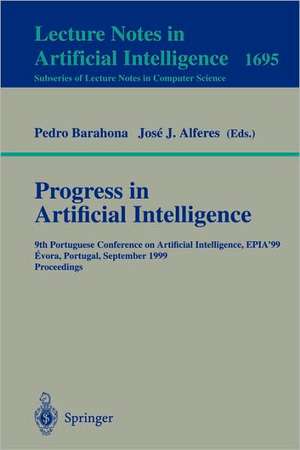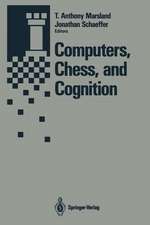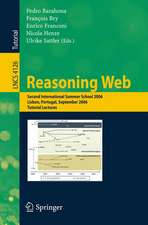Progress in Artificial Intelligence: 9th Portuguese Conference on Artificial Intelligence, EPIA '99, Evora, Portugal, September 21-24, 1999, Proceedings: Lecture Notes in Computer Science, cartea 1695
Editat de Pedro Barahona, Jose J. Alferesen Limba Engleză Paperback – 8 sep 1999
Din seria Lecture Notes in Computer Science
- 20%
 Preț: 1061.55 lei
Preț: 1061.55 lei - 20%
 Preț: 307.71 lei
Preț: 307.71 lei - 20%
 Preț: 438.69 lei
Preț: 438.69 lei - 20%
 Preț: 579.30 lei
Preț: 579.30 lei -
 Preț: 410.88 lei
Preț: 410.88 lei - 17%
 Preț: 427.22 lei
Preț: 427.22 lei - 20%
 Preț: 596.46 lei
Preț: 596.46 lei - 15%
 Preț: 448.04 lei
Preț: 448.04 lei - 20%
 Preț: 353.50 lei
Preț: 353.50 lei -
 Preț: 389.49 lei
Preț: 389.49 lei - 20%
 Preț: 309.90 lei
Preț: 309.90 lei - 20%
 Preț: 645.28 lei
Preț: 645.28 lei - 20%
 Preț: 763.23 lei
Preț: 763.23 lei - 15%
 Preț: 580.46 lei
Preț: 580.46 lei - 20%
 Preț: 310.28 lei
Preț: 310.28 lei - 20%
 Preț: 655.02 lei
Preț: 655.02 lei - 20%
 Preț: 1183.14 lei
Preț: 1183.14 lei - 20%
 Preț: 340.32 lei
Preț: 340.32 lei -
 Preț: 449.57 lei
Preț: 449.57 lei - 20%
 Preț: 591.51 lei
Preț: 591.51 lei - 18%
 Preț: 938.83 lei
Preț: 938.83 lei - 20%
 Preț: 337.00 lei
Preț: 337.00 lei - 20%
 Preț: 649.50 lei
Preț: 649.50 lei - 20%
 Preț: 607.40 lei
Preț: 607.40 lei - 20%
 Preț: 1414.79 lei
Preț: 1414.79 lei - 20%
 Preț: 1024.44 lei
Preț: 1024.44 lei - 20%
 Preț: 583.40 lei
Preț: 583.40 lei - 20%
 Preț: 453.32 lei
Preț: 453.32 lei - 20%
 Preț: 575.49 lei
Preț: 575.49 lei - 20%
 Preț: 1075.26 lei
Preț: 1075.26 lei - 20%
 Preț: 585.88 lei
Preț: 585.88 lei - 20%
 Preț: 825.93 lei
Preț: 825.93 lei - 17%
 Preț: 360.20 lei
Preț: 360.20 lei - 20%
 Preț: 763.23 lei
Preț: 763.23 lei - 20%
 Preț: 340.32 lei
Preț: 340.32 lei - 20%
 Preț: 504.58 lei
Preț: 504.58 lei - 20%
 Preț: 369.13 lei
Preț: 369.13 lei - 20%
 Preț: 580.93 lei
Preț: 580.93 lei - 20%
 Preț: 343.62 lei
Preț: 343.62 lei - 20%
 Preț: 350.21 lei
Preț: 350.21 lei - 20%
 Preț: 583.40 lei
Preț: 583.40 lei - 20%
 Preț: 583.40 lei
Preț: 583.40 lei - 15%
 Preț: 438.59 lei
Preț: 438.59 lei - 20%
 Preț: 341.95 lei
Preț: 341.95 lei - 20%
 Preț: 238.01 lei
Preț: 238.01 lei - 20%
 Preț: 538.30 lei
Preț: 538.30 lei
Preț: 337.66 lei
Preț vechi: 422.07 lei
-20% Nou
Puncte Express: 506
Preț estimativ în valută:
64.61€ • 69.09$ • 53.87£
64.61€ • 69.09$ • 53.87£
Carte tipărită la comandă
Livrare economică 17 aprilie-01 mai
Preluare comenzi: 021 569.72.76
Specificații
ISBN-13: 9783540665489
ISBN-10: 354066548X
Pagini: 404
Ilustrații: XII, 392 p.
Dimensiuni: 155 x 235 x 21 mm
Greutate: 0.56 kg
Ediția:1999
Editura: Springer Berlin, Heidelberg
Colecția Springer
Seriile Lecture Notes in Computer Science, Lecture Notes in Artificial Intelligence
Locul publicării:Berlin, Heidelberg, Germany
ISBN-10: 354066548X
Pagini: 404
Ilustrații: XII, 392 p.
Dimensiuni: 155 x 235 x 21 mm
Greutate: 0.56 kg
Ediția:1999
Editura: Springer Berlin, Heidelberg
Colecția Springer
Seriile Lecture Notes in Computer Science, Lecture Notes in Artificial Intelligence
Locul publicării:Berlin, Heidelberg, Germany
Public țintă
ResearchCuprins
Invited Lectures.- Combinatorial Optimization in OPL Studio.- Challenges for Inductive Logic Programming.- Holonic Multiagent Systems — Theory and Applications —.- Constraint Programming.- On the Accuracy and Running Time of GSAT.- The Impact of Branching Heuristics in Propositional Satisfiability Algorithms.- A Tractable Subclass of the Block Algebra: Constraint Propagation and Preconvex Relations.- Is a Tractable Language?.- Natural Language Processing.- Inclusion of Picture Sequences in Generated Documents.- Using LocalMaxs Algorithm for the Extraction of Contiguous and Non-contiguous Multiword Lexical Units.- On the Formal Distinction between Literal and Figurative Language.- Spatial Reasoning.- Qualitative Theory of Shape and Structure.- Logic Programming.- A New Formulation of Tabled Resolution with Delay.- YapOr: An Or-Parallel Prolog System Based on Environment Copying.- Theorem Proving.- Structure Theorems for Closed Sets of Implicates/Implicants in Temporal Logic.- Critical Agents Supporting Interactive Theorem Proving.- Reasoning Under Uncertainty.- A Practical Approach to Fusing Prioritized Knowledge Bases.- Fuzzy Behaviors and Behavior Arbitration in Autonomous Vehicles.- Multi-agent Systems.- A Multi-agent System for Electronic Commerce Including Adaptive Strategic Behaviours.- Choice and Institutions in Agent Societies.- Analytic Modal Revision for Multi-agent Systems.- Decisions Based upon Multiple Values: The BVG Agent Architecture.- Abduction and Revision.- Temporal Abductive Diagnosis.- A New Approach to Base Revision.- Improving Optical Music Recognition by Means of Abductive Constraint Logic Programming.- Genetic Algorithms.- Genetic Algorithms for Solving Open Shop Scheduling Problems.- Expressing Population Based Optimization HeuristicsUsing PLATO.























